第四讲----汉英句子翻译1
- 格式:doc
- 大小:52.00 KB
- 文档页数:14

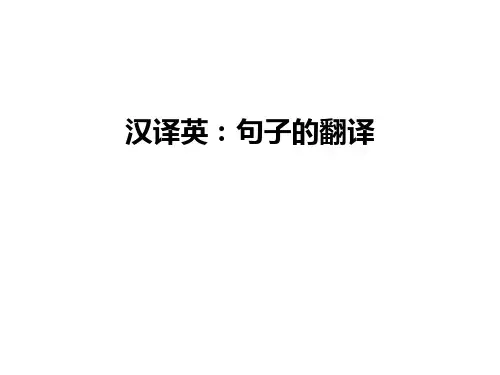
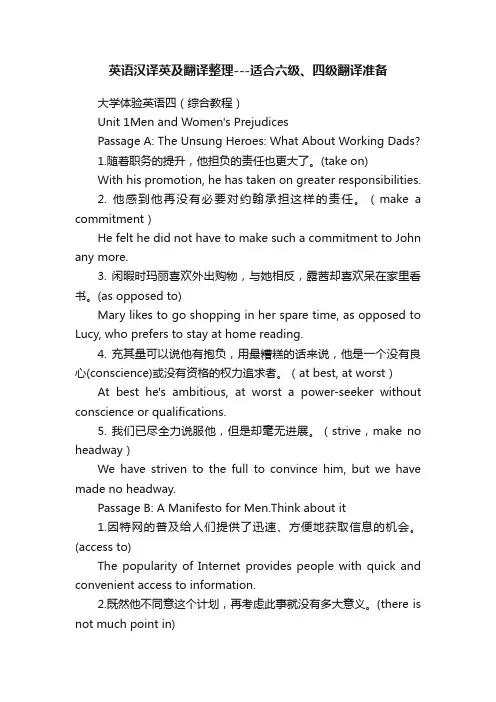
英语汉译英及翻译整理---适合六级、四级翻译准备大学体验英语四(综合教程)Unit 1Men and Women's PrejudicesPassage A: The Unsung Heroes: What About Working Dads?1.随着职务的提升,他担负的责任也更大了。
(take on)With his promotion, he has taken on greater responsibilities.2. 他感到他再没有必要对约翰承担这样的责任。
(make a commitment)He felt he did not have to make such a commitment to John any more.3. 闲暇时玛丽喜欢外出购物,与她相反,露茜却喜欢呆在家里看书。
(as opposed to)Mary likes to go shopping in her spare time, as opposed to Lucy, who prefers to stay at home reading.4. 充其量可以说他有抱负,用最糟糕的话来说,他是一个没有良心(conscience)或没有资格的权力追求者。
(at best, at worst)At best he's ambitious, at worst a power-seeker without conscience or qualifications.5. 我们已尽全力说服他,但是却毫无进展。
(strive,make no headway)We have striven to the full to convince him, but we have made no headway.Passage B: A Manifesto for Men.Think about it1.因特网的普及给人们提供了迅速、方便地获取信息的机会。
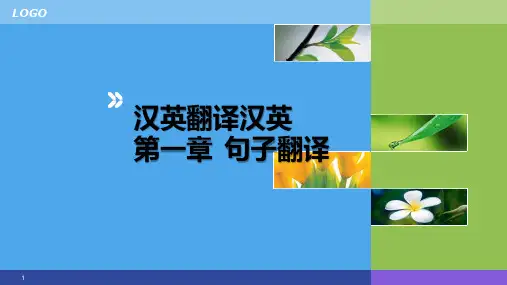
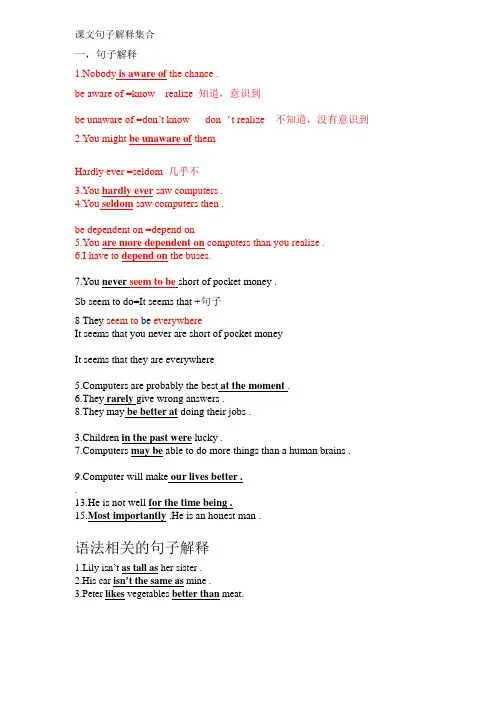
课文句子解释集合一,句子解释1.Nobody is aware of the chance .be aware of =know realize 知道,意识到be unaware of =don’t know don‘t realize 不知道,没有意识到2.You might be unaware of themHardly ever =seldom 几乎不3.You hardly ever saw computers .4.You seldom saw computers then .be dependent on =depend on5.You are more dependent on computers than you realize .6.I have to depend on the buses.7.You never seem to be short of pocket money .Sb seem to do=It seems that +句子8 They seem to be everywhereIt seems that you never are short of pocket moneyIt seems that they are everywhereputers are probably the best at the moment .6.They rarely give wrong answers .8.They may be better at doing their jobs .3.Children in the past were lucky .puters may be able to do more things than a human brains . puter will make our lives better ..13.He is not well for the time being .15.Most importantly .He is an honest man .语法相关的句子解释1.Lily isn’t as tall as her sister .2.His car isn’t the same as mine .3.Peter likes vegetables better than meat.。
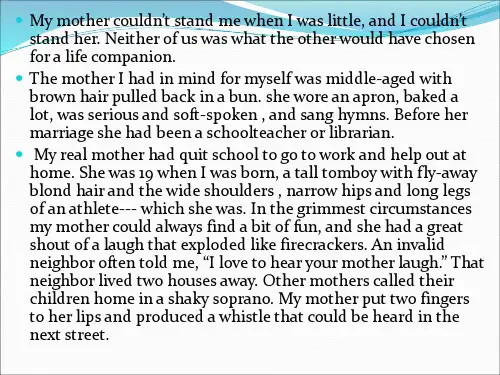
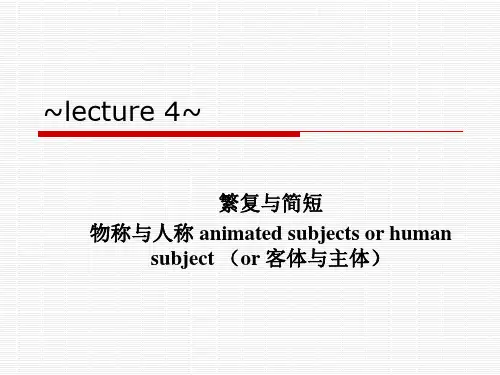
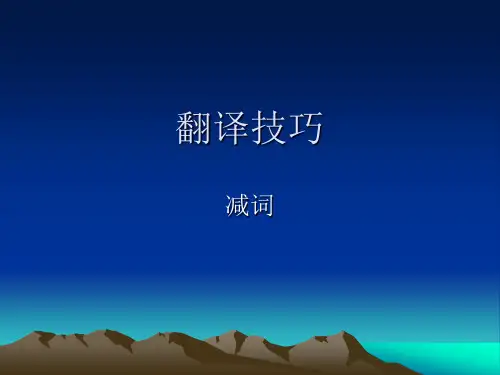
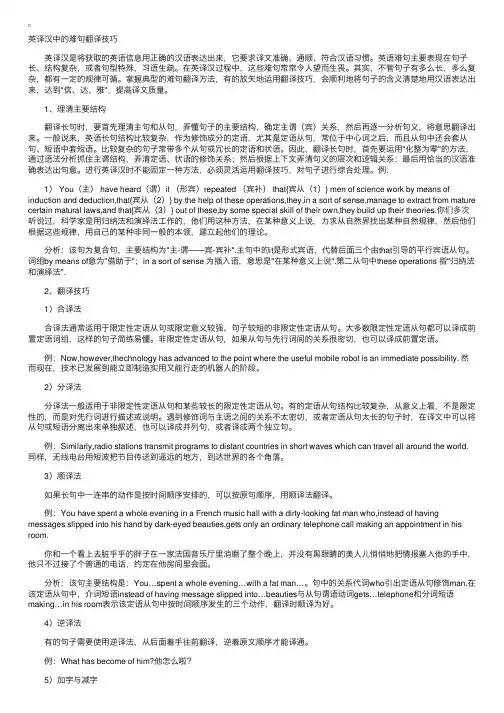
英译汉中的难句翻译技巧 英译汉是将获取的英语信息⽤正确的汉语表达出来,它要求译⽂准确、通顺、符合汉语习惯。
英语难句主要表现在句⼦长、结构复杂,或者句型特殊,习语⽣疏。
在英译汉过程中,这些难句常常令⼈望⽽⽣畏。
其实,不管句⼦有多么长,多么复杂,都有⼀定的规律可循。
掌握典型的难句翻译⽅法,有的放⽮地运⽤翻译技巧,会顺利地将句⼦的含义清楚地⽤汉语表达出来,达到"信、达、雅",提⾼译⽂质量。
1、理清主要结构 翻译长句时,要⾸先理清主句和从句,弄懂句⼦的主要结构,确定主谓(宾)关系,然后再逐⼀分析句义,将意思翻译出来。
⼀般说来,英语长句结构⽐较复杂,作为修饰成分的定语,尤其是定语从句,常位于中⼼词之后,⽽且从句中还会套从句、短语中套短语。
⽐较复杂的句⼦常带多个从句或冗长的定语和状语。
因此,翻译长句时,⾸先要运⽤"化整为零"的⽅法,通过语法分析抓住主谓结构,弄清定语、状语的修饰关系;然后根据上下⽂弄清句义的层次和逻辑关系;最后⽤恰当的汉语准确表达出句意。
进⾏英译汉时不能固定⼀种⽅法,必须灵活运⽤翻译技巧,对句⼦进⾏综合处理。
例: 1) You(主) have heard(谓)it (形宾)repeated (宾补) that{宾从(1)} men of science work by means of induction and deduction,that{宾从(2)} by the help of these operations,they,in a sort of sense,manage to extract from mature certain matural laws,and that{宾从(3)} out of these,by some special skill of their own,they build up their theories.你们多次听说过,科学家是⽤归纳法和演绎法⼯作的,他们⽤这种⽅法,在某种意义上说,⼒求从⾃然界找出某种⾃然规律,然后他们根据这些规律,⽤⾃⼰的某种⾮同⼀般的本领,建⽴起他们的理论。
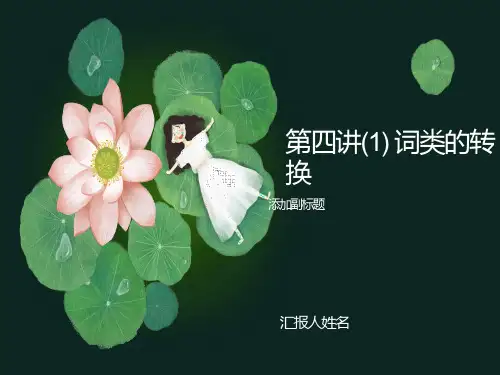
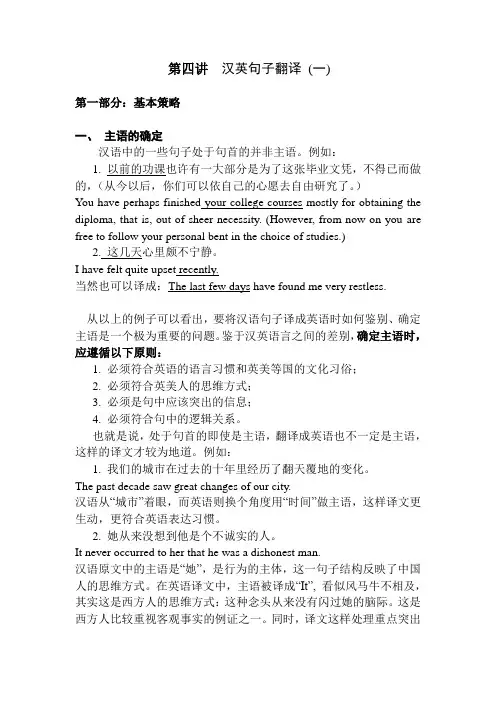
第四讲汉英句子翻译(一)第一部分:基本策略一、主语的确定汉语中的一些句子处于句首的并非主语。
例如:1. 以前的功课也许有一大部分是为了这张毕业文凭,不得已而做的,(从今以后,你们可以依自己的心愿去自由研究了。
)You have perhaps finished your college courses mostly for obtaining the diploma, that is, out of sheer necessity. (However, from now on you are free to follow your personal bent in the choice of studies.)2. 这几天心里颇不宁静。
I have felt quite upset recently.当然也可以译成:The last few days have found me very restless.从以上的例子可以看出,要将汉语句子译成英语时如何鉴别、确定主语是一个极为重要的问题。
鉴于汉英语言之间的差别,确定主语时,应遵循以下原则:1. 必须符合英语的语言习惯和英美等国的文化习俗;2. 必须符合英美人的思维方式;3. 必须是句中应该突出的信息;4. 必须符合句中的逻辑关系。
也就是说,处于句首的即使是主语,翻译成英语也不一定是主语,这样的译文才较为地道。
例如:1. 我们的城市在过去的十年里经历了翻天覆地的变化。
The past decade saw great changes of our city.汉语从“城市”着眼,而英语则换个角度用“时间”做主语,这样译文更生动,更符合英语表达习惯。
2. 她从来没想到他是个不诚实的人。
It never occurred to her that he was a dishonest man.汉语原文中的主语是“她”,是行为的主体,这一句子结构反映了中国人的思维方式。
第4章Unit 4 Economy1. 经济文章选篇。
其特点是:着重说明经济形势,提出主张和建议,以大量数据说明问题。
所用语言视场合而定,文件的语言正式而精练,演讲的语言则要比较易于上口。
2. 语言对比:(1)经济术语。
经济领域有大量的专门术语。
如:two way trade双向贸易l ucrative export markets 获利的出口市场foreign exchange 外汇commercial opportunities商业机会export opportunities 出口机会potential exports潜在市场(2)有些普通词语在经济文章中有特殊含义。
经济术语有特殊的用法和搭配。
例1)The result, I believe, is that we have built the beginnings of a sound foundation for future commercial and financial ties.我相信我们已经为今后贸易与金融关系初步打下了坚实的基础。
例2)There are more than 20 joint ventures between the US and Chinese investors.现在有20多家中美合资企业。
(3)数字及有关的术语和量词。
数字很容易出错,因此要特别仔细核对。
和数字有关的动词、介词、形容词、副词也很重要。
如“增加了”和“增加”表示的意思是不一样的。
by用来表示增加或减少的幅度。
表示倍数时汉语与英语不一样。
汉语:1)甲比乙...(形容词或副词)n倍:不包括基数。
2)甲是乙n倍:包括基数。
英语:1) "n+ times + adj.比较级+than"式:包括基数;2) "n+ times + as + adj. + as"式:包括基数;3) "verb (e.g. increase, grow, rise, be raised, etc.) + n + times"式:包括基数。
Lesson 4Activity 1 RevisionTranslation of the words, phrases and sentences what we learned last time Activity 2 Nida’s theory of translation--New Attitudes withRespect to the Receptor LanguageSome of the basic difficulties in translating are caused by the wrong views people often have of the receptor and the source languages. Because of this, in order to do well in translating, translators often need to change their view of the languages in which they are working. This task aims at helping you rethink of your attitude toward your receptor language. In our case, this is of course Chinese or English.Now go through the following four passages adapted from Nida and Taber (1969) and try to summarize each one in one sentence in the space provided. Passage 1First of all, it is essential to recognize that each language has its own genius. That is to say, each language has certain distinctive characteristics, e.g., word-building capacities, unique patterns of phrase order, techniques for linking clauses into sentences, markers of discourse, and special discourse types of poetry, proverbs, and songs. Each language is also rich in vocabulary for the areas of cultural focus, e.g. cattle in Sudan, hunting and fishing in Peru, or technology in the western world.Each language has its own geniusPassage 2When translating, one must respect the features of the receptor language and exploit its potentialities to the greatest possible extent. There are some unfortunate cases where translators have actually tried to “remake” a language. For example, one missionary in Latin America insisted on introducing the passive voice of the verb into a language which had no such form. Not surprisingly, his efforts turned out to be futile. One must simply accept the fact that there are many languages which do not have a passive voice. They merely choose to report actions only as active.To communicate effectively one must respect the genius of each language. Passage 3Some translators do not see how people who have no snow can understand a passage that speaks about “white as snow”. The answer to this question is varied. Firstly, many people have a word for snow even if they have not themselves experienced it. Secondly, in other instances, people do not know snow, but they do have “frost” and they speak about the twowith the same term. Thirdly, many languages have other equivalent idioms, e.g., “white as egret(白鹭) feathers”, or “white as fungus (菌类, 蘑菇)” (if there is an especially white form of fungus). The point is that snow as an object is not crucial to the original message. Of course if the form in which a message is expressed is an essential element of the message itself, then there is a limitation in communicating the message from one language to another.Anything that can be said in one language can be said in another, unless the form is an essential element of the message.Passage 4Since all languages differ in form, quite naturally the forms must be changed if one is to preserve the content. The extent to which the forms must be changed in order to preserve the meaning depends on the linguistic and cultural distance between the source and receptor languages. The easiest transitions occur when one translates from a language such as English into German for the two are quite similar to each other both linguistically and culturally. On the other hand, if one is translating from English into Hungarian, the formal shifts will be greater, for Hungarian belongs to a different language family than English. However, Hungarian is still part of the same cultural setting as English. Hence, the shifts are not so extreme. If however, one has to translate from English into Zulu, which belongs t the so-called Bantu family of languages and represents quite a different culture, the formal modifications must be more extreme.To preserve the content of the message the form must be changed. Naturally, a new attitude towards the receptor language implies a new view of the source language as well. We don’t have to go into the great details in this respect, for there are a lot of similarities between the attitude concerning the receptor language and that concerning the source language. It suffices (vi.足够, 有能力vt.使满足) our purpose to bear in mind the following three implications with respect to the source language. (1) The source language is subject to the same limitations as any other natural language; (2) the writers of the source language expect to be understood; and (3) the translator must attempt to reproduce the meaning of a passage as understood by the writer.Activity 3 Languages Differ: Differences in Clause OrderWe have done some serious thinking about the nature of translating. Well, to be a good translator, only serious thinking is not enough. We should also practice as hard as we can and as much as we can. In this activity, we shift our attention to examining the differences in clause order between English and Chinese and the impact this has on our translating. In Chinese, we say就要毕业的学生们仍在教室里学习 while in English the same meaning is presented as Those students who were to graduate very soonwere still studying in the classroom. In the Chinese sentence, the attributive就要毕业的 is placed before 学生们 and the adverbial 在教室里 is placed before 学习, while in the English sentence, the attributive who were to graduate very soon is put after those students and the adverbial in the classroom is put after studying.Task 1 Where to Put the AttributiveQuestions:1.In Chinese, where is an attributive put?2.In English, where is an attributive put?3.Is there a difference between the word attributive and phraseattributive concerning their positions in a sentence?(Both in English and Chinese)In English, when a word is used as an attributive to modify a noun, it is usually placed before the noun, though on some rare occasions it can also be placed after noun. In Chinese an attributive is almost always put before the noun it modifies.Now translate the following phrases into Chinese, paying special attention to the positions of the attributives.1.a well-managed company 一家管理完善的公司2.the architect’s luxurious house 建筑师的豪华住宅3.the ancient Chinese philosophers 中国古代的哲学家们4.something urgent 紧急的事情5.somewhere unknown 不为人所知的某个地方Of course, not only can single words serve as attributives, but short phrases as well. In English, when a short phrase is used as an attributive to modify a noun, it is usually placed after the noun, while in Chinese it is usually put before the noun.Now translate the following items into Chinese, again paying special attention to the positions of the attributives.1.a project of building up the first corpus of spoken Chinese in China (创立中国第一个汉语口语语料库的项目)2.a student with a lot of complaints for the university(一个对学校颇多抱怨的学生)3.particles moving round their atomic nucleus(环绕原子核运动的粒子)4.a machine able to recognize human voice(能识别人的声音的机器)5.a girl wearing a long white dress(穿着白色长裙的姑娘)6.a book easy to read(一本容易读的书)Read the textbook P23-24Conclusion: Usually in English, the word attributive is put before the noun, and the phrase attributive is put after the noun, but in Chinese, it is almost always for attributives to be put before the noun.Task 2 Where to Put the Adverbial1.In Chinese, where is an adverbial put?2.In English, where is an adverbial put?3.Is there a difference between the word adverbial which modifies an adjective and the word adverbial which modifies a verb concerning their positions in a sentence?(Both in English and Chinese)Now translate the following sentences into Chinese or English, paying special attention to the positions of the adverbials.1.She was not particularly beautiful, but she certainly left a deepimpression on everybody.(她并不是特别地美丽,但她显然给每个人都留下了深刻的印象。
第4讲:汉英对比1.汉语先说事,英语先表态•听说你们开发成功了一项新产品,我们十分感兴趣。
(p.56 [例2])We are all interested in the new product you have successfully developed.•We shall be very much obliged if you will quote us the price for this model.如蒙报此型号的价格,不胜感激。
3. 收到贵方3月15日询盘并得知贵公司有意购买我方绒毛玩具,非常高兴。
We are pleased to receive your inquiry of March 15 and to hear that you are interested in our plush toys.2. 逻辑和叙事顺序(p.56)时间→地点地点→时间从大到小从小到大按时间先后说,讲究“先来后到”先考虑信息主题,再按语法框架排列例1 )这是正在兴建的上海宝山基础设施改造项目中的发电厂。
(按逻辑顺序)This is the power plant under construction at the Baoshan Works, Shanghai, as part of the Infrastructure Improvement Project. (按语法框架)2)该公司在美国纽约百老汇大街34号设有办事处。
(从大到小)The company operates a branch office at 34 Broadway, New York, USA.(从小到大)3)该货轮于2001年12月22日上午8时离开加拿大魁北克,将于2002年3月2日到达英国伦敦。
(时间→地点)The ship left Quebec, Canada, at eight o’clock on the morning of December 22, 2001 and is due to arrive in London, England, on March 2, 2002. (地点→时间)4)Drafts to be presented for negotiation in China within 15 days after shipment, but within the validity of credit.汇票须于装运后15日内在中国议付,但议付须在本证有效期内办理。
第四讲汉英句子翻译(一)第一部分:基本策略一、主语的确定汉语中的一些句子处于句首的并非主语。
例如:1. 以前的功课也许有一大部分是为了这张毕业文凭,不得已而做的,(从今以后,你们可以依自己的心愿去自由研究了。
)You have perhaps finished your college courses mostly for obtaining the diploma, that is, out of sheer necessity. (However, from now on you are free to follow your personal bent in the choice of studies.)2. 这几天心里颇不宁静。
I have felt quite upset recently.当然也可以译成:The last few days have found me very restless.从以上的例子可以看出,要将汉语句子译成英语时如何鉴别、确定主语是一个极为重要的问题。
鉴于汉英语言之间的差别,确定主语时,应遵循以下原则:1. 必须符合英语的语言习惯和英美等国的文化习俗;2. 必须符合英美人的思维方式;3. 必须是句中应该突出的信息;4. 必须符合句中的逻辑关系。
也就是说,处于句首的即使是主语,翻译成英语也不一定是主语,这样的译文才较为地道。
例如:1. 我们的城市在过去的十年里经历了翻天覆地的变化。
The past decade saw great changes of our city.汉语从“城市”着眼,而英语则换个角度用“时间”做主语,这样译文更生动,更符合英语表达习惯。
2. 她从来没想到他是个不诚实的人。
It never occurred to her that he was a dishonest man.汉语原文中的主语是“她”,是行为的主体,这一句子结构反映了中国人的思维方式。
在英语译文中,主语被译成“It”, 看似风马牛不相及,其实这是西方人的思维方式:这种念头从来没有闪过她的脑际。
这是西方人比较重视客观事实的例证之一。
同时,译文这样处理重点突出了“她”对“他为人不诚实”这一点而感到惊奇。
3. 我给你打国际长途就跟给楼下的李姐打电话差不多,一拨就通。
An international phone call to you is as easy as a call to Sister Li downstairs.原文的主语是“我”,而译文的主语则是“an international phone call”。
因为“国际长途电话很方便”在原文中是非常重要的信息,译文中应该放在突出的位置,而且“an international phone call”作主语可以使后面的谓语更为洗炼、简洁,也更符合英美人的表达习惯。
4. 宗教不得干预政治。
It is impermissible to interfere with politics in the name of religion.宗教本身不会发出动作干预政治,是人们/团体以宗教的名义对政治进行干预。
因此,若译为:Religion must not interfere with politics .就不符合原句中的逻辑意义了。
5. 汉字在历史上有过不可磨灭的功绩。
* Chinese characters have made indelible contributions in history.The system of Chinese characters has played an invaluable role in the history.此例是汉语中常见的拟人法语言。
拟人法的现象在汉语中常见;在英语中,多数情况下,是视为修辞上的一种毛病(不符合逻辑事实)。
因此在汉英翻译中要注意这个区别,避免受汉语字面的影响而使译文有Chinglish的味道。
6. 我们恢复和采取这些贸易方式的原因很简单:因为我们出口商品就是为了我们国外客户消费方面的需要。
*The reason for us to restore and adopt these trade practices is very simple because our export commodities are for the use and consumption of our foreign customers.The reason why we have restored and adopted these trade practices is very simple .Our export commodities are for the use and consumption of our foreign customers.汉语“……的原因是因为……”,不能译成the reason is ……because……,不符合英语逻辑。
the reason why……是地道的英语。
所以,针对中英文逻辑上的不同,翻译时行文要及时变通。
7. 笆,用竹子、柳条等编成的一种东西。
Ba is something made of bamboo or willow branches.对中国人来说,该汉语句子根本不成问题,因为整体印象是对的;但是译成英语,除了要注意“等” 此处表示“列举后煞尾”,而不是“列举未完” 之外,还必须分析:“竹子”和“柳条”是并列关系,还是选择关系?换句话说,“笆”是用“竹子”和“柳条”一起编的,还是编一物时只选其一?由于只能是后者,英语就要用or;若用and 就不对了。
二、主语与谓语的习惯搭配有些动词,在汉语里只能用于人,而在英语里,既可用于人,也可用于物。
如:汉语的“目睹”,我们只能说人“目睹”,不能说物“目睹”;而英语的see ,witness ,或escape,既可以用于指人,也可以用于物。
例如:罗马遭遇了历史上的大事件:Rome witnessed great historic events.再如:1. 我没注意到这个错误。
The mistake escaped me (or my notice).2.这个运动首先在天津开始。
Tianjin first saw the rise of the movement.但有些动词,在汉语中既可用于人也可用于物,而在英语中则只能用于物,不能用于人。
遇到这种情况,在汉译英时,我们可以采取改变谓语动词或改变主语的方法。
例如:3. 蹲在池塘边苇丛中的青蛙叫得更起劲了。
*The frogs that sat among the reeds by the pond were shouting more enthusiastically than before.The frogs that crouched among the reeds by the pond were croaking more vigorously than before. “蹲”“叫”、在汉语中既可用于人也可用于动物,但是英语“sat, shouting” 与主语frogs 搭配不当;动词crouch (lower the body by bending the knees),croak (frog makes the deep low noise),用于指动物的行为。
4. 上海港不断更新设备,这个港口的生产已经面目一新。
*Now the production at this port has taken on a new look, as the workers of Shanghai port has constantly replaced old equipment with new.The workers of Shanghai port have constantly replaced old equipment with new and expanded its handling capacity.港口的装卸工作并不能“produce things ”,只是“move them”。
此例说明,有时我们通过改变原文主语的方法来使译文的主语与谓语搭配。
5. 任何新生事物的成长都是要经过艰难曲折的。
New things always have to experience difficulties and setbacks as they grow.此句把原文主语的定语作为译文的主语。
6. 他眼明手快。
*His eyes are bright and his hands are quick .(不符合英文逻辑)He is quick of eye and deft of hand.7. 这篇文章浅显易懂。
*This article is obvious and easy. (不符合英文逻辑)This article is easy to read and understand.8. 我对他敬而远之。
*I stand afar from him.I stand aloof from him.英语afar(far off)表达空间上的距离;而aloof (distant in feeling) 指情感上的远离,语义更准确。
三、词的增减1. 词的增补如前所述,汉语属意合语言,英语属形合语言。
汉译英时须把汉语中无需用而英语中却不可少的词增补出来。
1)增补结构词:连词,介词,代词(尤其是物主代词),冠词等群众心齐了,一切事情都好办。
When the masses are of one heart, everything becomes easy.我们应当逐步消灭城乡差别。
We should gradually eliminate the differences between town and country.她用手蒙住脸,好像是为了保护眼睛。
She covered her face with her hands, as if to protect her eyes.2) 为了使译文意思明确,增补实义词等要提倡顾全大局。
We should advocate the spirit of taking the whole situation into consideration.结婚大办宴席,实在可以免去了。
The practice of giving lavish feasts at weddings can well be dispersed with.三个臭皮匠赛过诸葛亮。
Three cobblers with their wits combined are superior to Zhuge Liang the master mind.2.词的省略1)省略重复词:汉语结构词(虚词)用得少,但为了讲究句子的平衡、气势、韵调等,常常重复实词——名词、动词、形容词等;而英语恰恰相反:一般来说,结构词不能少,实词却很少重复。